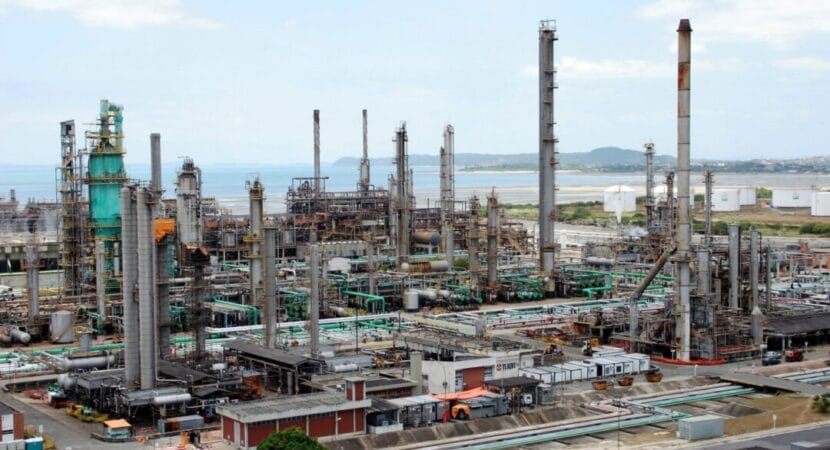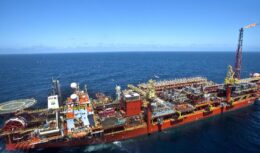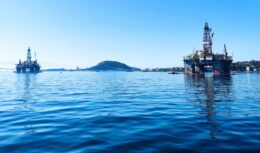
Oil refining still relevant despite pressure to reduce fossil fuels. Energy in transition, global demand and climate change influence the scenario.
Refineries play a crucial role in extracting and processing oil, converting it into a variety of products such as gasoline, diesel and other fuels. The growing demand for renewable energy has led refineries to seek cleaner and more sustainable alternatives for energy production, reducing carbon emissions and pollution associated with traditional oil.
Refineries and the Reduction of Carbon Emissions
According to the International Energy Agency (IEA), the consumption of fossil fuels, like diesel and gasoline, for example, has not yet reached its peak, which should occur in 2026.
As demand is not falling, but climate changes impose an effort to cut emissions greenhouse gases, it becomes even more important to reduce the carbon intensity of oil refining and fuel production.
Find out how this is possible and what has been done in Brazil.
- When will the world stop using fossil fuels?
- Why not end fossil production altogether?
- How do refineries decide what to do to reduce environmental impacts?
- What is already underway in Brazil
- What can still be done
- To what extent is it possible to decarbonize traditional oil refining?
- How will this industry adapt in the long term?
At the last United Nations Climate Change Conference (COP28), in Dubai, the countries' final declaration was the first to include a ‘transition away’ fossil fuels, but did not bring any specific target for eliminating the use of coal, oil and gas.
Most countries still do not have a clear goal for the end of the use of these products and prefer to focus on seeking to achieve net zero emissions, which does not necessarily mean the end of fossil fuels, as it opens up space for emissions to continue, as long as compensated.
Brazil, for example, aims to achieve net neutral emissions by 2050. As part of Brazil's contribution to the Paris Agreement, it is foreseen the increase in the share of bioenergy in the energy matrix to 18% by 2030, the year in which the country expects achieve an estimated share of 45% of renewable energy in the matrix.
In other words, there is still no concrete perspective for ending the use of fossil fuels in the coming decades.
As demand continues to exist, failing to produce fuels without replacing them with another energy source will create shortages and increase prices.
Reducing the supply of products such as diesel, gasoline and liquefied petroleum gas (LPG) without other alternatives being available on the same scale can lead to an increase in inflation and energy poverty.
In recent years, one of the factors that contributed to the increase in the crack spread (the refining margin, measured by the difference between the price of the derivative and that of crude oil) for diesel in the world was precisely the deactivation of old refineries, especially in Europe.
Consultants point out that 75% of products consumed in Brazil are transported by trucks, the majority of which are still powered by diesel.
‘The transition will occur, but, at the same time as we have to guarantee an energy transition at a good speed, we have to do it with energy security, which is the guarantee of generating social well-being for the population. In other words, preserve social well-being and not generate global energy inflation’, he summarizes Marcelo Lyra, vice president of Communication, ESG and Institutional Relations at Acelen, owner of the Mataripe refinery, in Bahia.
Key initiatives underway in the world today include increase efficiency in the use of energy and water, in addition to the reuse of by-products that are pollutants.
There are already technologies capable of converting gases from hydrotreatment units into fertilizers, for example. In the case of energy, there are initiatives to replace fossil sources with renewable ones.
Decisions on the technologies adopted are based, above all, on the analysis of which equipment within the refineries are the most emitting and what is the potential emission reduction curve, in relation to costs. In addition, studies are carried out on the integration between the different units within the refinery and the possibilities of optimizing it, in order to deliver more products using less raw material and energy, leading to fewer emissions.
‘The initial step is to send the appropriate molecules to the appropriate units within the refinery – that is, optimizing the refining configuration. We call this concept ‘molecular precision’’, he says. Leon Melli, sales director at Honeywell UOP, a North American company that provides technologies for refineries.
These efforts are taking place both in new units and in the reconfiguration of existing ones. Older plants, which have not undergone technological updating processes, tend to present greater opportunities for reducing emissions, says Melli. According to him, it is also necessary to evaluate the potential to optimize the configuration of plants.
‘It is important not only a technological update, but also the analysis of a change in the strategic objectives of the refining assets as a whole. A study that assesses whether what is being consumed as petroleum cast is being converted into a mix of products in the most economically efficient way possible’, he states.
The main refining companies in the country are betting on efficiency gains and the use of solar energy. A The initiatives are detailed below:
Petrobras
The state-owned company is responsible for most of the country's refining park and leads the initiative RefTOP, program of operational efficiency for refining launched in 2021. The project is expected to receive $1,1 billion in investments until 2030.
The company says that the objective is to have the refining park with performance similar to the best in the world, taking refineries in the United States as a reference, but has not yet detailed the parameters used to measure these advances.
The program was born focused on refineries in the Southeast, assets that the company intended to maintain after the divestment program carried out under the governments of Michel Temer and Jair Bolsonaro. In the first two years, the project generated US$589 million in earnings, according to the company. After giving up sales of refining assets, the initiative was extended to the entire park in 2023.
Recently, Petrobras announced its intention to replace the use of fossil hydrogen in refining processes with renewable sources, but has not yet detailed how. The oil company is one of the largest consumers of hydrogen in the country, with a demand of around 500 thousand tons per year.
The state-owned company is also considering installing photovoltaic solar generation cells in four refineries.
The first photovoltaic installation will be the Gabriel Passos Refinery (Regap), in Betim, Metropolitan Region of Belo Horizonte. The forecast is that a solar plant with 11 megawatts (MW) capacity will come into operation in 2025. The other three units being evaluated to receive the project are the Paulínia Refinery (Replan) and the Henrique Lage Refinery (Revap), both in São Paulo, and the Abreu e Lima Refinery (Rnest), in Pernambuco.
When asked about the potential for reducing emissions with the use of renewable sources, the company stated, in a note, that 'a reduction in emissions is expected due to the operational integrations that the projects allow, including the reduction in natural gas consumption '.
Refineries: Acelen Invests in Efficiency and Emissions Reduction
Acelen, which operates the Mataripe Refinery (BA), has invested in operational improvements since taking over the asset, in December 2021. The plant was purchased in the Petrobras divestment process.
With investments in operational improvements that led to increased refinery efficiency, the company estimates that it stopped emitting 273 thousand tons of CO2 in cargo processed since taking over the plant.
Efforts included replacing engines and generators, as well as improvements to boilers and revisions to piping to reduce leaks, for example, as well as processes to reduce particulate emissions. In 2022, Acelen invested R$1,4 billion in operational improvements and reduction of environmental impacts.
To mitigate emissions when importing the oil cargo that is processed at the unit, the company also purchased carbon credits.
Marcelo Lyra explains that when the company took over the asset, the processed cargo was around 200 thousand barrels/day of oil, a volume that now reaches close to 290 thousand barrels/day due to efficiency gains.
Last year, the company reduced electricity consumption by 7%, equivalent to the demand in the state of Acre, in addition to increasing water reuse in operations by 7%.
In a move similar to that of Petrobras, Acelen announced this year a partnership with the Perfin fund and Ilian Renováveis, from the Electra group, for the construction of a photovoltaic solar plant in Bahia with an installed capacity of 161 megawatts at peak. The agreement includes the sale of energy generated at the plant to Acelen, under the self-production model.
Carbon capture and storage in geological reservoirs (CCS) is one of the main bets by experts to reduce the impacts of pollutants generated in traditional refining. ‘It’s a model that could benefit Brazilian refineries’, says the director of Honeywell.
the creation of legal framework for CCS activities is still under discussion in the National Congress. Petrobras itself has already indicated that it is interested in the activity with a view to decarbonizing its own operations, as well as providing this service to other companies.
Efforts to reduce the impacts of traditional refining are focused on carbon emissions. scope 1, which are a direct result of operational activities, and of scope 2, which are those arising from energy consumption.
This is because it is more difficult to decarbonize the scope 3, which concerns the supply chain and products, as it is based on fossil fuels. However, it is precisely this that concentrates the highest carbon intensity in the sector: around 80 to 95% of total emissions of oil and gas companies are scope 3.
According to the director of Honeywell UOP, one of the ways to reduce the impacts of scope 3 is to advance the integration between refining and petrochemicals. ‘This is essential so that we can gradually migrate from the pure production of fuels to that of high-value-added products, such as polymers and elastomers’, he explains.
The tendency is to migrate to the biorefining, replacing oil with biomass in fuel production.
As part of this movement, Petrobras has initiatives to implement plants dedicated to the production of aviation biokerosene and 100% renewable diesel at the Presidente Bernardes Refinery (RPBC), in São Paulo, and at the Polo Gaslub, in Rio de Janeiro, which will be completed after 2028.
The company is also working in partnership with Ultra and Braskem to transform the Riograndense Refinery, in Rio Grande (RS), into a biorefinery by 2026.
Another initiative is the development of diesel R, technology capable of processing petroleum diesel along with a portion of renewable content, such as vegetable oil or animal fat. In other words, it is still a product with fossil content, but with fewer emissions.
The company has two refineries that process diesel with 5% renewable content (R5), the Presidente Getúlio Vargas Refinery (Repar), in Paraná, and the RPBC, in São Paulo. By the end of the year, this product will also be delivered to Replan and the Duque de Caxias Refinery (Reduc), in Rio de Janeiro.
The first testing the use of diesel R5 in a fleet of buses occurred in 2022.
Acelen is also keeping an eye on biorefining. The company plans to invest US $ 2,5 billion to enter the production of sustainable fuel
Source: EPBR











